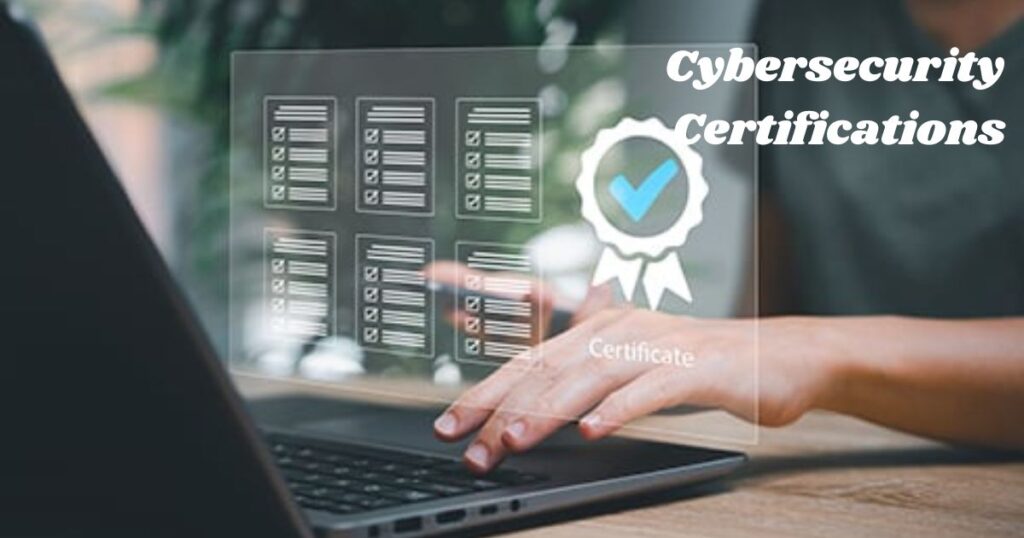
Cyber security is of the highest concern in this era of digitalization. With the exponential development of technology, organizations across the globe are facing ever-rising cyber attacks. This demand has created the necessity for qualified staff who can secure confidential information and keep system trust. And as you’re seeking to further your career in this area, getting a respected Cyber Security certification is a surefire way to demonstrate your expertise.
This article will explore the top five cyber security certifications that can help you stand out and boost your career.
Why Cyber Security Certifications Matter

Cyber security qualifications show how an individual reacts to a cyber attack on the network, the system, and the data. They verbalize out loud what they are comfortable with and what employers wish (i.e. In reality certifications are related to higher employment, higher income, and higher professional standing in a field. No matter what experience is there, a certification can play an important role in work as well.
1. Certified Information Systems Security Professional (CISSP)
The CISSP designation is seen as one of the best in the area of cyber security. Developed (ISC)² it is a practitioner programme of study for professional practitioners, delegates of which can demonstrate competence in designing and delivering cyber security programmes.
Key Features:
- Domains, e.g., risk management, network security, and software insecurity.
- Recognized globally and often required for senior-level positions.
Benefits:
- High earning potential: In the field CISSP holders are among the highest paid.
- Demonstrates comprehensive knowledge of cyber security concepts.
Who Should Pursue It:
Appropriate for professionals with a minimum of 5 years experience in information security, etc.
2. Certified Ethical Hacker (CEH)
EC council is exhibiting “white-hat hacking” and “penetration testing” (CEH certificate) as shown below. It offers the solution to prevent and detect system vulnerabilities from being exploited for criminal purposes earlier than they might be by a blackmailer.
Key Features:
- Hands-on training in ethical hacking techniques.
- Tool and method that are used by attackers for effective-looking attacks.
Benefits:
- In-demand skill set: Ethical hackers are critical for preempting cyber threats.
- Emancipates the job market of penetration tester security analyst, and so on.
Who Should Pursue It:
Suitable for IT professionals with a background in networking and security. Who aspires to become an EHC (ethical hacking and security) expert.
3. CompTIA Security+
CompTIA Security+ is a vendor-neutral, entry-level certification, providing. A good foundation of knowledge for the security of the computer. It is publicly known and a requirement before the further certification process.
Key Features:
- Includes fundamental topics such as network security, threat management, and risk mitigation.
- Vendor-neutral certification applies to various technologies and industries.
Benefits:
- Great for beginners: There is no prior experience required, so it is good for newbies.
- Widely accepted by employers across different sectors.
Who Should Pursue It:
Comprehensible to individuals beginning a career in IT or cyber security.
4. Certified Information Security Manager (CISM)
ISACA provides the Certified Information Security Manager (CISM) certification, which is specifically designed for security practitioners interested in planning and leading enterprise-level security programs. It is highly valued in leadership roles.
Key Features:
- Emphasizes governance, risk management, and compliance.
- Focused on aligning security practices with business goals.
Benefits:
- Recognized as a leading credential for managerial positions.
- Enhances skills in strategic planning and security program management.
Who Should Pursue It:
Ideally suited for IT managers and IT professionals interested in cyber security leadership roles.
5. Certified Cloud Security Professional (CCSP)
With increasing relevance for a greater number of cloud technologies, the CCSP certification from (ISC) is highly sought after. It is a confirmation of skill in securing the cloud infrastructure and the protection of sensitive data.
Key Features:
- Covers cloud architecture, data security, and compliance.
- Made with professional cloud platform users in mind (e.g., AWS, Azure, Google Cloud).
Benefits:
- Addresses the unique challenges of cloud security.
- High demand for certified professionals in cloud-centric organizations.
Who Should Pursue It:
Most suitable for IT experts with experience in cloud computing and security.
How to Choose the Right Certification
The choice of the right certification is based on the aims of the career, the level of experience, and specialization. The following advice can help you make a decision:
Assess Your Career Goals:
- Are you aiming for a managerial role? Consider CISM or CISSP.
- Interested in technical roles? CEH or CCSP might be a better fit.
Evaluate Your Experience:
- For beginners, security+ can be started first to gain a strong foundation”, etc.
- Specifically, for professionals who have experience in related fields, it is suggested that more professional certification (e.g., CISSP or CISM) can be adopted.
Consider Industry Trends:
- With the proliferation of cloud computing, the importance of the CCSP grows.
- Ethical hacking ability is topical at all times, and will always be so so the Chartered Engineer’s Council for Ethical Hacking (CEH) is requested very often.
Research Job Requirements:
- Note which jobs have the highest demand for certificates (i.e., click through) on the in-field job postings.
Preparing for Cyber Security Certification Exams
Earning a certification requires dedication and preparation. The following actions will help you succeed:
Study Resources:
- Use accredited study guides and mock exams provided by the awarding body.
- Sign up for training either on the web or in person to learn further.
Gain Hands-On Experience:
- Practical experience is crucial for applying theoretical knowledge. Set up a home lab or participate in simulations.
Join Study Groups:
- Work together with classmates to exchange study advice and knowledge.
Practice Time Management:
- Allocate regular study sessions and stick to a schedule.
Conclusion
Acquiring a cyber security qualification is a good idea for anyone to progress to the cutting edge of this fast-paced industry. Each of the above certifications (CISSP, CEH, CompTIA Security+, CISM, and CCSP) both target audiences who belong to very different career streams with very different levels of expertise/skills. Whether you are a beginner or an expert, there is a qualification to support you towards your career ambitions.
As well as being able to improve, getting certified will also demonstrate your commitment to maintaining a leadership role in an evolving area of cyber security. Just take the first step today toward a meaningful and successful career.
FAQs
1. What is the best entry-level certification for cyber security?
CompTIA Security+ is an excellent start for the beginner. It covers fundamental concepts and doesn’t require prior experience.
2. It all depends on the person and the test.
Preparation time depends on the certification and background knowledge. It can generally take 2-6 months to study intensively.
3. Are cyber security certifications worth it?
Okay, a certification shows competency, it increases your earning opportunities and it can also provide access to better work.
4. No, it is possible to get a cybersecurity certification even without any technical background.
Absolutely! Many certifications, such as CompTIA Security+, are targeted at novice professionals and contain base training.
5. Which cyber security certification is best for cloud security?
Certified Cloud Security Professional (CCSP) is an international competency framework in cloud security.

